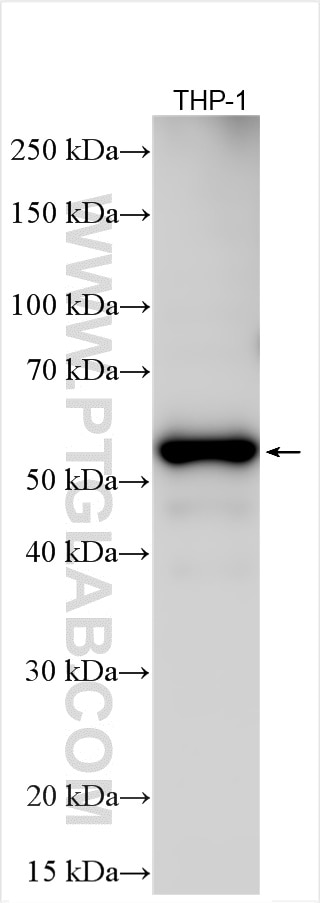Validation Data Gallery
Tested Applications
| Positive WB detected in | THP-1 cells |
Recommended dilution
| Application | Dilution |
|---|---|
| Western Blot (WB) | WB : 1:2000-1:10000 |
| It is recommended that this reagent should be titrated in each testing system to obtain optimal results. | |
| Sample-dependent, Check data in validation data gallery. | |
Product Information
29080-1-AP targets RIPK3 in WB, ELISA applications and shows reactivity with human samples.
| Tested Reactivity | human |
| Host / Isotype | Rabbit / IgG |
| Class | Polyclonal |
| Type | Antibody |
| Immunogen | RIPK3 fusion protein Ag30337 相同性解析による交差性が予測される生物種 |
| Full Name | receptor-interacting serine-threonine kinase 3 |
| Calculated molecular weight | 518 aa, 57 kDa |
| Observed molecular weight | 57 kDa |
| GenBank accession number | BC062584 |
| Gene Symbol | RIPK3 |
| Gene ID (NCBI) | 11035 |
| RRID | AB_3086097 |
| Conjugate | Unconjugated |
| Form | Liquid |
| Purification Method | Antigen affinity purification |
| UNIPROT ID | Q9Y572 |
| Storage Buffer | PBS with 0.02% sodium azide and 50% glycerol{{ptg:BufferTemp}}7.3 |
| Storage Conditions | Store at -20°C. Stable for one year after shipment. Aliquoting is unnecessary for -20oC storage. |
Background Information
RIPK3,also named as RIP3, a Ser/Thr kinase of RIP (Receptor Interacting Protein) family, is recruited to the TNFR1 signaling complex through RIP and has been shown to mediate apoptosis induction and NF-κB activation. RIPK3 is a nucleocytoplasmic shuttling protein and its unconventional nuclear localization signal (NLS, 442-472 aa) is sufficient to trigger apoptosis in the nucleus(PMID:18533105). It has 3 isoforms produced by alternative splicing. RIPK3 might form a homodimer within cells, and its apoptotic activity may not be required for this dimerization(PMID:18533105).
Protocols
| Product Specific Protocols | |
|---|---|
| WB protocol for RIPK3 antibody 29080-1-AP | Download protocol |
| Standard Protocols | |
|---|---|
| Click here to view our Standard Protocols |
